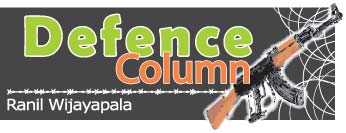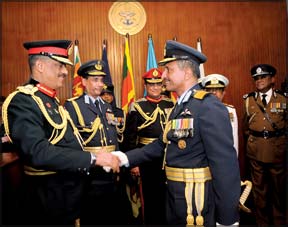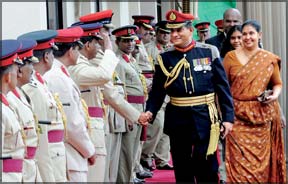New changes in the Defence establishment

The changes in the high command of the Armed Forces except for the
Sri Lanka Air Force came as a surprise to many, last Sunday although a
majority of the people were aware of the fact that there may be changes
in the defence sector in the post conflict scenario.
Although many were aware that new Chief of Defence Staff will soon be
appointed with wide range of powers there was no indication as to who
was going to be appointed for the post with the retirement of Air Chief
Marshal Donald Perera.
With the implementation of the Chief of Defence Staff Act, a serving
commander has to be appointed as the Chief of Defence Staff.
Although top defence brass was aware that such changes were going to
take place by Friday it was on Saturday they were asked to be present at
the President’s House to accept their new appointments from the
President.
Diamond Jubilee
Army Commander General Sarath Fonseka and Security Forces Commander (Vanni)
Major General Jagath Jayasuriya along with many other senior Army
officials were there at the Army Headquarters discussing about the
Diamond Jubilee of the Army to be celebrated on October 10 when they
were informed to be at the President House the following morning.
|

Chief of Defence Staff General Sarath Fonseka along with
outgoing CDS Air Chief Marshal Donald Perera, the three
Forces Commanders and the IGP as he assumes duties at the
Joint Operations Headquarters Pictures by Rukmal Gamage |
On Sunday morning President Mahinda Rajapaksa handed over the Act of
appointments, making key changes in the Defence hierarchy of the country
in recognition of the services rendered by the Service Commanders in
salvaging the country from the clutches of LTTE terrorism that was the
number one priority of the Mahinda Rajapaksa administration.
The objective of the Government by making these changes was to
sustain the great victory achieved by the Security Forces without
allowing any terror movement to raise its ugly head once again.
Chief of Defence Staff
With this objective in mind President Mahinda Rajapaksa as the
Commander in Chief, appointed General Sarath Fonseka as the Chief of
Defence Staff in accordance with the powers vested with him under the
Chief of Defence Staff Act as stipulated in the section 2 of the Act.
The formation of the new Chief of Defence Staff post with wide range
of powers is timely step taken by the Government considering the rapid
expansion of the three Armed Forces during the past few years.
With the creation of this new institution, directly under the
Secretary to the Ministry of Defence, major changes are to take place in
the three Forces as certain mechanisms are to be evolved to have joint
operations plans, training and intelligence gathering by the three Armed
Forces.
|

Army Commander Lt. General Jagath Jayasuriya greets senior
officers of the Army as he assumed duties on Wednesday. |
New appointments are likely to be made at the Joint Operations
Headquarters or the Chief of Defence Staff office that is to be
established at the second floor of the Ministry of Defence shortly.
The Staff of the Chief of Defence Staff will consist of members of
the Armed Forces and others.
The Act also stipulates ‘Where Armed Forces personnel are deployed
for service in the office of the Chief of Defence Staff, such deployment
shall be done by the Secretary in consultation with the Commander of the
Army, the Commander of the Navy or the Commander of the Air Force, as
the case may be.”
Appointed
According to sources a number of senior officers from the Sri Lanka
Army are to be appointed for the top posts in the CDS office.
Accordingly Major General L.A.D. Amaratunga, Major General Mahesh
Senanayaka, Brigadier Prasanna de Silva, Brigadier Dampath Fernando,
Brigadier Prasad Samarasinghe, Brigadier Amal Karunasekera and Brigadier
G.S. Padumadasa are tipped to be appointed to the staff of the Chief of
Defence Staff.
Brigadier Maithree Dias will be appointed as the Military Assistant
to the CDS. Major General Jagath Jayasuriya who was serving as the
Security Forces Commander, Vanni was made the Commander of the Army.
|

Outgoing Navy Commander Admiral Wasantha Karannagoda greets
his successor Vice Admiral Thisara Samarasinghe. Picture by
Saman Sri Wedage |
It came as a surprise to Major General Jagath Jayasuriya as he was
not in the top of the Army seniority list as it was the tradition to
appoint the most senior Army officer as the Commander of the Army when
the vacancy fell vacant.
The appointment was made under the powers vested with the President
as the Commander in Chief and may be the first time in the history of
the Sri Lanka Army, a field Commander who had held no key appointment
such as Chief of Staff, Deputy Chief of Staff at the Army Headquarters,
being directly elevated to the post of Army Commander.
However, Major General Jagath Jayasuriya who had served in the Army
for more than 30 years as an efficient and honest officer was lucky
enough to reach this high post at the age of 50 although it came as a
surprise to him.
Jagath Jayasuriya has earned reputation as a kind hearted and simple
individual who is capable of handling things efficiently during his
military career.
Vanni liberation
He was the key figure in the Vanni liberation operation although he
had not directly been involved in the operational matters of the
offensive Divisions but handled logistics and administrative matters
during the entire operation. He was appointed as the Security Forces
Commander Vanni after his senior command course in China in July, 2007
only a few months after the formation of the 57 Division which initiated
the Vanni liberation humanitarian operation from Madhu area.
From then onwards he continuously held this position facilitating the
Vanni liberation operation until it reached its final victory in
Vellamullivaikkal area on May 19, 2009 and was present at the battle
front encouraging the filed commanders and fulfilling their
requirements. He has another four years service until his retirement at
the age of 55.
Appointment
President Mahinda Rajapaksa also presented the Act of appointment to
Admiral Wasantha Karannagoda as the National Security Advisor on the
same occasion.
Admiral Karannagoda has done a unique service to the Sri Lanka Navy
during his tenure as the 15th Commander of the Navy.
It was during his tenure the Sri Lanka Navy was able to increase its
blue water capabilities having conducted operations in the deep seas in
international waters to destroy LTTE floating warehouses. The
destruction of ten such LTTE floating warehouses was carried out during
his tenure bringing down the LTTE arms smuggling capabilities to its
lowest level.
Rear Admiral Tisara Samarasinghe who was only a few days ahead of his
retirement from the Sri Lanka Navy with the completion of 55 years was
appointed as the successor to Admiral Wasantha Karannagoda, to become
the 16th Commander of the Navy at the age of 55 with a one year
extension granted to him.
Loved
Tisara Samarasinghe is reputed to be an officer displaying hundred
percent efficiency and professionalism when handling Naval operations
and other Naval matters. He is loved by his subordinates for his
fatherly character.
He has also displayed his capability to handle things at diplomatic
level when the Sri Lanka Navy was confronted with waves of allegations
for harassing and killing of Indian fishermen, as he was the Commander
of the Northern Naval Area.
It was he who under the guidance of Admiral Wasantha Karannagoda
increased the efficiency of the operations of the troops carrier ‘Jet
Liner’ by introducing a system to load and unload 3,000 troops plus
cargo within a 15 minute period at the Kankesanturai harbour which was
within the artillery range of the LTTE until Pooneryn was liberated by
the Army.
With those appointments the President also made two other
appointments. Major General G. A. Chandrasiri, the Chief of Staff of the
Army and the Competent Authority of the Displaced Civilians was
appointed as the Governor of the Northern Province and former Governor
Dixon Dela was appointed the Sri Lanka High Commissioner to Maldives.
These changes in the defence hierarchy came when the nation is about
to mark the completion of two months to its great victory that brought a
sigh of relief to the entire nation.
Defeating terrorism
As the Government has already faced the challenge of defeating
terrorism the next objective will be to sustain that victory without
allowing another dark period to envelop this country. Therefore, the
newly appointed commanders and the Chief of Defence Staff will be
entrusted with restructuring the Armed Forces of the country to face
this new challenge.
According to General Fonseka the three Forces and the Police will
have to adopt new technology to face this challenge effectively if it is
to be achieved without further increasing the man power of the Armed
Forces.
For this, according to his opinion, the mobility and the surveillance
capabilities of the all three Armed Forces have to be increased.
Apart from this objective the three Forces will also be entrusted
with the task of the concentrating on maintaining the security of the
newly liberated areas, the de-mining process and the resettlement of the
displaced civilians in the North.
De-mining activities
The Army and the Police have already designed their security plan for
Kilinochchi and Mullaitivu with the formation of new Security Forces
Headquarters in Kilinochchi and Mullaitivu and with the decision to
establish new Police stations in the North.
In the same breath the Sri Lanka Army, has also taken the initiative
to expedite the process of de-mining activities to complete that task as
soon as possible. General Fonseka addressing the media at the Joint
Operations Headquarters said that every soldier capable of de-mining
will be deployed to complete this task very soon successfully.
Welcomed
He also welcomed the Indian Government’s move to send 500 Army
personnel trained in de-mining activities to Sri Lanka to expedite this
process to facilitate the speedy resettlement of the civilians.
Therefore, the new changes in the Defence hierarchy will go parallel
to the Government objective bringing normality to the entire country.
As Defence Secretary Gotabhaya Rajapaksa stated very recently the
victory achieved by the Security Forces will be meaningful only when
normality is restored in the entire country.
The Chief of Defence Staff and the newly appointed Commanders also
assured their support to the Government initiative to develop the North
under the Northern Spring program and for all the other programs for
development of the country to bring real benefits of the war victory to
the people.
Therefore, the new changes in the defence hierarchy will undoubtedly
bring positive results on the nation’s march towards prosperity as it is
a move in the right direction to achieve overall the objective of the
nation at last.
|



